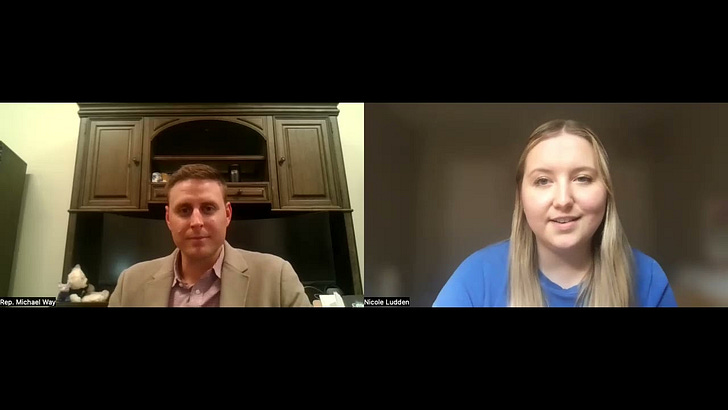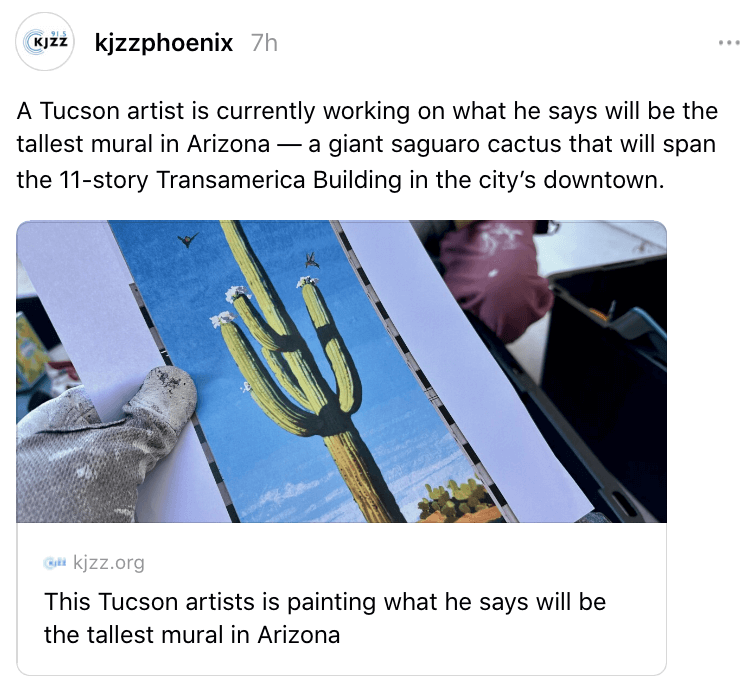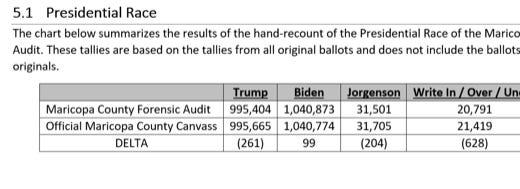
New lawmaker Q&A: Rep. Michael Way
Making charter schools and laws … Nomination complications … And the Gulf of Agenda.
CORRECTION: We previously stated Way testified under oath that he believed the Arizona Freedom Caucus funded the lawsuit challenging his residency. He clarified he was referring to a single North Carolina Freedom Caucus member who he thought was behind the complaint.
Freshman Republican Rep. Michael Way faced a bigger hurdle than most Republican candidates do when running for office in his blood-red district.
He was hit with a lawsuit alleging he can’t run for one of Legislative District 15’s House seats because he voted in North Carolina in 2021 and 2022. All signs pointed to far-right Freedom Caucus Republicans funding the litigation to get their preferred candidate on the ballot.
Way won the case and the election as the top vote-getter. He said the case helped with “name recognition.”
And he appears to have put the whole thing behind him.
“For all we know, it could be the Democrats … So whoever it is obviously doesn't want their name to be known. I wouldn't want to either if I were them, so we're just going to let it lie,” Way said.
Way runs business development for Charter One, a service provider for charter schools that his family started, and said he’s been “pushing for school choice” behind the scenes before advocating for it politically.
His dad, Glenn Way, is a former Utah lawmaker who brought his American Leadership Academy to Arizona and banked millions of taxpayer dollars from charter schools.
But Way didn’t flood his campaign messaging with school choice issues. Instead, border security was his key message. We asked him what that should look like in Arizona.
“From a legislative position, doing whatever I can to support President Trump and trying to get Katie Hobbs to have a more secure border,” he said.
This session, some of Way’s bills include:
An anti-DEI bill that prohibits state agencies from considering race or ethnicity when hiring people. It bans public funding for programs that promote race-based policies or mandatory training about race or ethnicity.
Prohibiting school districts from teaching “antisemitic curricula or activities.” The Arizona Department of Education would have to investigate any complaints.
Making law enforcement agencies explain why rejected applicants weren’t hired.
Like all the subjects of our freshman Q&A series, we had some pressing questions prepared for Way.
Q: If you could trade places with any other politician for a day, who would it be?
A: Way’s interested in what a day in the life of Vice President JD Vance looks like. But he’d also like to “see what Katie Hobbs does every day.”
Q: What’s the best piece of advice someone gave you when you first took office?
A: “There's no such thing as permanent friends. There's no such thing as permanent enemies. Just self-interests.”
Q: If you could sponsor one bill that you knew would become law, which would it be?
A: His HB2521, which would prohibit foreign funding in election administration.
Q: What’s one moment or experience that made you decide to run for office?
A: Being on the floor of Utah’s Legislature with his dad influenced Way’s political aspirations. But he also recalls a turning point as he sat on the couch with his family during the onset of the pandemic.
“Seeing everything getting shut down no matter what I was doing, the government was able to come in and tell us what and how to do it, and I remember feeling extremely helpless … watching the election results of 2020, and everything fishy that went on there, and just thinking to myself, ‘Okay, it's always been in the back of my mind.’
But it was at that moment on the couch — my kids were crawling over me — and I'm like, okay, I've been working behind the scenes. I've been working in the private sector. I'm going to have to step forward sooner rather than later. And it was at that moment that I realized that I was going to run.”
Q: If House Republicans had a Spotify playlist, what song would you add to it?
A: Way has been playing the Black Eyed Peas for his kids on the way to school, so he’d pick something from their repertoire.
In the last few weeks, we’ve interviewed four freshman lawmakers to give you better insight into the new people representing you at the state Legislature.
We asked Republican Rep. Nick Kupper, Democratic Rep. Brian Garcia, Democratic Sen. Lauren Kuby and Republican Rep. Michael Way pressing questions ranging from their biggest campaign controversies to what song they’d add to their caucus’ Spotify playlist. You can find the interviews under the “New Lawmaker Q&As” section on our homepage.
But we want to know — what do you want to hear about from your lawmakers? And who else would you like to see subjected to our new Q&A series?
Let us know in the survey below.
Nomination retaliation: The long-running battle between Gov. Katie Hobbs and Republican senators resumed last week as the Senate’s Committee on Director Nominations started back up, the Republic’s Stacey Barchenger reports. Hobbs and Republican Sen. Jake Hoffman, who leads the committee, have sparred over director nominations since 2023. At one point, Hobbs withdrew her nominees and named them “executive deputy directors” in charge of departments to circumvent Senate confirmation. But she lost a court battle over that gambit last year. The first nomination of the year, putting Michael Wisehart in charge of the Department of Economic Security, went through easily. But Republican lawmakers then called for the resignation of Hobbs’ pick to run the Department of Housing, Joan Serviss, over an audit that found the department lost $2 million to fraud.
Testing the limits: Although Arizona voters approved a ballot measure in November that guaranteed abortion as a fundamental right in the state constitution, Republican Rep. Rachel Keshel is trying to make it harder to obtain abortion-inducing drugs, Capitol scribe Howie Fischer reports. The Tucson lawmaker’s bill would require that a doctor independently verify the pregnancy, among other new requirements. It’s just one of the bills from GOP lawmakers that are testing the limits of Prop 139.
Worried about the consequences: Slashing Medicaid funding might be going too far for GOP Rep. Juan Ciscomani, the Republic’s Stephanie Innes reports. Republican leaders in the U.S. House proposed a budget that would reduce funding for Medicaid, the public health insurance program that primarily serves low-income people, by $880 billion over the next decade. Those cuts “would have serious consequences,” Ciscomani said, pointing to rural and Hispanic-majority communities that already have trouble keeping hospitals open. He didn’t answer the Republic’s question about whether his concerns over Medicaid, which serves 2 million Arizonans, would be enough to make him vote against the overall budget proposal.
Funding restored: Migrant children won’t see their legal aid cut off, now that the Trump administration backtracked on last week’s directive to stop funding a program that provides legal representation for unaccompanied children, NBC News reports. The deputy director of the largest provider of legal aid to immigrants in Arizona called the news “unequivocally good,” but she was still worried about future attacks on immigrant rights from the Trump administration, the Arizona Mirror’s Gloria Rebecca Gomez reports.
The backtracking by the Trump administration came after widespread reporting and public outcry. If you’d like to see what else the First Amendment can do, subscribe to the Arizona Agenda and find out.
Burning question: What does the Arizona State Mine Inspector actually do? The current officeholder, Paul Marsh, explains it all to the Capitol Times’ Reagan Priest. Basically, his office is the “OSHA, if you will, for the mining sector.” Marsh himself got his professional start by taking an Occupational Safety and Health Administration course after serving in the Marine Corps. His office inspects every mine in the state at least once a year, and more often for the bigger ones, to make sure miners’ working conditions are safe. The results of those efforts made mining in Arizona “actually safer than working in retail or education.” His office also works on closing the 100,000 holes in the state that remain from mines that operated more than a century ago.
Nuclear data: If you live in rural Arizona, a nuclear reactor could be coming your way soon, the Arizona Mirror’s Jerod MacDonald-Evoy reports. Data centers are popping up in Arizona and they need a lot of electricity. House Majority Leader Michael Carbone wants to clear away state regulations and local zoning restrictions to make it easier to build small modular reactors to power those data centers. His bill, HB2774, would exempt reactors from local zoning in every county except Pima and Maricopa. The bill got a boost last week when the GOP-controlled House Natural Resources Committee approved it along party lines.'
Now everybody can feel like a president. MapQuest is allowing users to rename the Gulf of Mexico whatever they like. The navigation company said they “still hadn’t figured out” how to update their maps after President Donald Trump renamed it the Gulf of America.
MapQuest isn’t the only one poking fun at the president’s rebranding of the gulf. The most ambitious example we saw came from a Bluesky user who wanted to rename the Pacific Ocean the “Gulf of Chile.”



















No Way. First Way’s dad has pocketed $37m from creating Charters. While Musk is taking the time to call astronauts “retarded” on Twitter he might look at that. DEI, my question, WHAT ARE YOU SO AFRAID OF? Sorry for screaming. As a college graduate, female and even white, I couldn’t get a credit card without my husband or dad signing with me. My boyfriend, no problem. I couldn’t buy a house or car alone. Ever drive through the south during the 60’s and 70’s with white only signs. Statistics show we’ve come a long way but we are still not there. Proven by the dais of white rich guys at Trump’s inauguration.
State Rep Rachel Keshel, stop wasting AZ taxpayers time and money by trying to pass bills limiting abortions! Those bills will be immediately challenged in court, if they make it past the Governor. Waste of OUR money, so stop it! The voters have spoken loudly on the right to abortion, and no one will make anyone get one unless they want it! How about considering bills on things we really need: water policy, public education funding, efficient state services, etc.